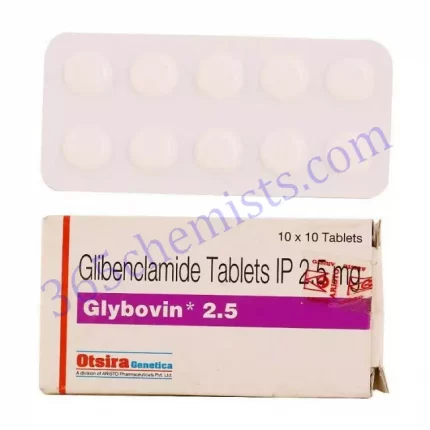Overview
Glimepiride, the active component of Amaryl 2mg Tablet, is a member of the sulfonylureas drug class. For the management of type 2 diabetes mellitus, it is frequently recommended. Glimepiride works by causing the pancreas to release more insulin and making peripheral tissues more sensitive to it, which helps to regulate blood sugar levels.
Usage and Dosage
You should take Amaryl 2 Tablet exactly as directed by your doctor. The dosage may change based on personal aspects such your blood sugar levels, treatment response, and other medical problems. Pay attention to your doctor’s or chemist’s directions. Amaryl 2 Tablet is typically used once daily, ideally with breakfast or the first substantial meal of the day. With a glass of water, completely assimilate the tablet. If not directed otherwise by your healthcare professional, do not chew, crush, or break the tablet.
Precautions and Warnings
Prior to using Amaryl 2 Tablet, it’s critical to be aware of the following warnings and precautions:
- Amaryl 2 Tablet may result in hypoglycemia (low blood sugar), particularly if used in greater doses or when combined with other drugs that also drop blood sugar. Shaking, dizziness, sweating, confusion, and a rapid heartbeat are all signs of hypoglycemia. Regular blood sugar checks are crucial, and you should exercise caution if you see any symptoms of low blood sugar. To treat hypoglycemic attacks, keep a source of sugar, such as glucose pills or juice, close at hand.
- Glimepiride, the substance that gives Amaryl 2 Tablet its active component, may cause allergic reactions in some people. Seek emergency medical assistance if you have symptoms including a rash, itching, swelling, or trouble breathing.
- Liver or Kidney Issues: People with liver or kidney issues should use Amaryl 2 Tablet with caution. While using this drug, your doctor may need to change the dosage or keep a closer eye on your liver or kidney function.
- Heart Issues: Let your doctor know if you’ve ever had heart issues since Amaryl 2 Tablet may make cardiovascular events more likely. In such circumstances, your doctor will weigh the advantages and disadvantages of using this drug.
- Surgery or Medical Procedures: If you are having surgery or a medical treatment, let your doctor know. It may be necessary to temporarily stop taking Amaryl 2 Tablet.
- Amaryl 2 Tablet is not advised for use during pregnancy or when nursing a baby. If you are pregnant, intend to become pregnant, or are currently breastfeeding, speak with your healthcare professional about alternate treatment choices.
- Patients over the age of 65: Senior citizens may be particularly sensitive to the hypoglycemia effects of Amaryl 2 Tablet. It’s crucial to closely check blood sugar levels and follow up with a doctor frequently.
Related Product
Amaryl 1mg Tablet
Amaryl 2mg Tablet
Amaryl 3mg Tablet
Amaryl M 1mg Tablet
Amaryl M 2mg Tablet
Amaryl M Forte 1mg Tablet
Amaryl M Forte 2mg Tablet
Amaryl MV 1mg Tablet
Amaryl MV 2mg Tablet
Side Effects
The Amaryl 2 Tablet may have certain unwanted effects. Typical negative effects include:
- As previously indicated, Amaryl 2 Tablet can result in hypoglycemia, or low blood sugar. Keep an eye out for hypoglycemia symptoms and take the necessary action to treat it.
- Effects on the Digestive System: Some people may develop digestive system issues such nausea, vomiting, diarrhoea, or stomach discomfort. Typically, these symptoms are minor and short-lived.
- Although uncommon, adverse reactions to Amaryl 2 Tablet might happen. If you have symptoms like a rash, itching, swelling, or trouble breathing, seek medical help right away.
- Skin symptoms: Amaryl 2 Tablet use has been associated with skin symptoms, such as rash, redness, or itching. Consult your healthcare practitioner if you experience any skin changes.
Before beginning Amaryl 2 Tablet, it is crucial to discuss your medical history, existing medications, and any concerns with your healthcare professional in order to guarantee its safe and efficient use. To establish ideal glycemic control, regular blood sugar testing and follow-up visits with your healthcare professional are crucial.
Interactions with Other Medications
Other medications, including prescription prescriptions, over-the-counter medicines, and herbal supplements, may interact with Amaryl 2 Tablet. To prevent potential interactions, it’s crucial to let your healthcare professional know about every medicine you’re currently taking. The following medicines may interact with Amaryl 2 Tablet:
- Amaryl 2 Tablet may raise the risk of hypoglycemia when combined with other antidiabetic drugs like insulin or other sulfonylureas. To avoid low blood sugar levels, your doctor may need to change the dosage of these medications.
- Beta-blockers: These drugs, which are frequently prescribed to treat heart disease and excessive blood pressure, can conceal the signs of hypoglycemia. It may be challenging to identify and manage low blood sugar levels as a result. If you take beta-blockers along with Amaryl 2 Tablet, close blood sugar monitoring is required.
- Water pills: Some diuretics, sometimes referred to as “diuretics,” may raise blood sugar levels. When using Amaryl 2 Tablet with diuretics, blood sugar levels should be closely monitored.
- Nonsteroidal Anti-Inflammatory Drugs (NSAIDs): NSAIDs, such ibuprofen and naproxen, can interfere with blood sugar regulation and raise the risk of hypoglycemia. While taking Amaryl 2 Tablet, use NSAIDs with caution, and keep a close eye on your blood sugar levels.
- Some Antibiotics: Some antibiotics, including sulfonamides and fluoroquinolones, may have an impact on blood sugar levels. If you are prescribed antibiotics while using Amaryl 2 Tablet, let your doctor know.
- It is essential to speak with your doctor or chemist for a complete list of possible drug interactions. Based on the precise medications you are taking and your medical background, they can offer tailored advise.
Storage and Handling
Amaryl 2 Tablet should be handled carefully in order to preserve its efficacy and guarantee your safety. Take into account these suggestions:
- Amaryl 2 Tablet should be kept at room temperature away from moisture and sunlight.
- Keep children and pets away from the drug.
- After the expiration date indicated on the container, do not use Amaryl 2 Tablet. Properly dispose of any expired medication.
- For advice on correct disposal procedures, speak with your pharmacist or the local waste disposal authority if you no longer need Amaryl 2 Tablet or if its expiration date has passed.
Summary
A drug called Amaryl 2 Tablet is used to treat type 2 diabetes mellitus. It contains glimepiride, which raises insulin sensitivity and stimulates insulin release to lower blood sugar levels. To achieve ideal glycemic control, it’s critical to take Amaryl 2 Tablet as directed, maintain a nutritious diet, and get frequent exercise. Be aware of any possible side effects and safety warnings for Amaryl 2 Tablet, and ask your doctor for specific guidance. Effective diabetes management requires regular blood sugar level monitoring and follow-up visits with your healthcare professional.












